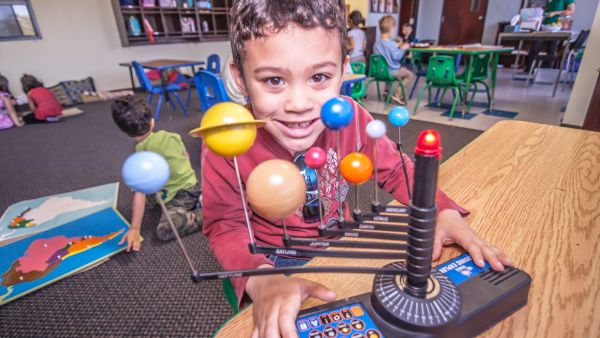
The Montessori philosophy is a unique approach to education that is based on observing the way children learn and play. Maria Montessori’s ideas and methods became the basis for a holistic approach that has pioneered the modern educational field.
What Children Need
The Montessori philosophy is centered around the idea that children already want to learn and grow. This self-motivation only needs direction; children don’t know what’s important, but they will happily explore any materials that are placed in front of them.
The general Montessori attitude is one of encouragement and support. Children are allowed to learn at their own pace, and teachers provide regular guidance to make sure no student feels left behind. Montessori students feel confident because they know their community is behind them.
How Children Learn
Children absorb sensory information and make connections about how various problems can be solved. They learn new concepts through exploration and repetition. Montessori schools treat hands-on learning as the most effective method; students are encouraged to complete an activity related to the subject they want to learn.
Montessori students are always allowed to choose their own activities. This ensures that the student is actually interested in the topic and will engage fully with the lesson. Work cycles are generally uninterrupted, which encourages each child to get lost in their chosen activity. If a student gets bored, they can switch to another activity, ensuring they never run out of steam.
What Teachers Can Provide
A Montessori teacher is a guide and a curator. Teachers provide major contributions to the classroom environment, from choosing learning materials to maintaining a positive flow throughout the school day. And because children learn through observation, teachers provide an example of adult behavior and help shape the way their students see the world.
The Montessori method acknowledges the importance of this role and encourages teachers to be appropriate behavioral models for their students. Montessori teachers hold themselves to the same standard they expect from their students. They often take pride in being an adult that their class can look up to.
How Students Change
One of the final principles of the Montessori philosophy is that student’s educational needs change as they grow and develop. Younger children are more interested in developing sensory skills and physical understanding, while older children become attracted to hands-on tasks that encourage their sense of independence. Maria Montessori noted several unique development stages, and many Montessori teachers start their lesson plans with their students’ current age group in mind.
The essence of the Montessori philosophy is that children need both structure and freedom. Good teachers create a safe environment where children can fulfill their natural interest and curiosity. As students get older, they try more complicated activities, until they are eventually capable of doing anything they set their minds to.





















